Home | Category: Humans, Sharks and Shark Attacks
SHARK FIN SOUP
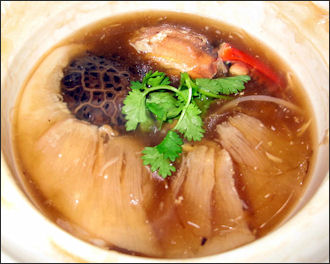
Shark fin stew Shark fin soup popular in southern China, Singapore, Hong Kong and in Chinese and Asian communities all over the world. It has a glutinous texture and is made by boiling shark fins with vinegar, starch and spices. Quality shark fin soup contains mushrooms, dried ham, other seafood, clear chicken stock and is simmered for up to eight hours. Once a dish for Ming Dynasty emperors, shark fin soup is considered a must-have at Chinese wedding banquets and corporate dinners and is often served at 80th birthday celebrations. A Chinese banquet is not regarded as complete without shark fin soup. It has traditionally been served to impress guests. At wedding banquets it is seen as a sign of appreciation from the host to guests. A shark fin wholesaler in Singapore told Reuter, "Shark fin has been a traditional food for the Chinese for thousands of years. There is something missing if you go to a wedding dinner with no shark's fin."
China consumes more shark fin than any other country in the world, according to the campaign group WildAid. Shark fin soup is also served at business lunches and dinners to celebrate a new deal. One Hong Kong banker told the New York Times, “This is a very basic dish for business dinners in Hong Kong. If you don’t order that, you will lose face.”
Shark fin soup was once regarded as a delicacy that only the rich could afford. Four hundred years ago shark fin soup was served at banquets for emperors and wealthy nobles and merchants. Emperors reportedly fancied it because it was exotic and difficult to prepare and they liked the taste. In recent years as China has become wealthy, more and more people can afford it. Now there are many well-off middle class people that can afford it and there numbers are increasing all the time.
Chefs say that shark fins have little flavor. They are valued more for the texture — and virility some say — they add. Their texture and what flavor they have comes from the ribbons or “noodles,” — gelatinous needle-like fibers of collagen — that make up the fins and are left behind when the skin and cartilage are stripped away. The flavor tends to come from the ingredients its is cooked with more than the shark fins. Shark fins are generally sold dry and soaked in water before they are cooked. Boil-in-the bag shark fin soup, a specialty of Hong Kong, requires great care to make.
Reporting from Beijing, Simon Denyer wrote in the Washington Post, Shark fin soup is believed to have been created more than 1,000 years ago by an emperor in the Sung dynasty who was trying to show off to his guests. Consumption of the expensive soup was revived in recent years at banquets and weddings as a sign of social status. But it became so popular that 10 of the 14 species of oceanic sharks most commonly fished for their fins are at “very high” or “high” risk of extinction — including iconic species like the Great Hammerhead — and the other four are approaching that status, according to conservation groups. [Source: Simon Denyer, Washington Post, October 19, 2013 ^^]
See Separate Articles: HISTORY OF HUMANS AND SHARKS: ANCIENT PEOPLE, ART AND WRITERS ioa.factsanddetails.com; ENDANGERED SHARKS AND COMMERCIAL FISHING ioa.factsanddetails.com; SHARK PRODUCTS ioa.factsanddetails.com; WEIRD FOODS IN CHINA factsanddetails.com; RATS AS FOOD IN CHINA factsanddetails.com ; SNAKES AS FOOD IN CHINA factsanddetails.com ; EATING INSECTS IN CHINA factsanddetails.com ; DOGS AND CATS AS FOOD IN CHINA factsanddetails.com ; WILD ANIMALS AND ENDANGERED SPECIES AS FOOD IN CHINA factsanddetails.com ; BEAR PARTS AND CHINESE MEDICINE AND FOOD DELICACIES factsanddetails.com ; PANGOLINS: AND THE CHINESE MEDICINE-FOOD TRADE factsanddetails.com ; ENDANGERED ANIMALS factsanddetails.com; ILLEGAL ANIMAL TRADE factsanddetails.com; ILLEGAL ANIMAL TRADE IN ASIA factsanddetails.com; COMBATING THE ILLEGAL ANIMAL TRADE IN ASIA factsanddetails.com
Consuming Shark Fin Soup
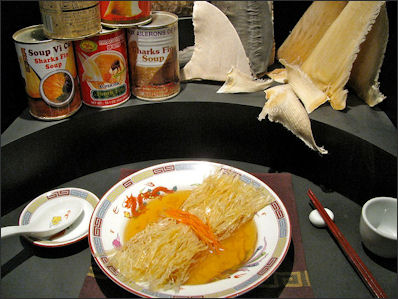
Shark Fin products L.A. food critic Jonathan Gold wrote in the Los Angeles Times,”I still remember the last time I ate shark's fin, in a grand, now-defunct Monterey Park seafood palace, more than 15 years ago. This restaurant had been proud of its pricey shark's-fin specialties, so much so that it showcased its finest specimens in glass cases, where they had the stark, ghostly presence of museum displays, although by this time some connoisseurs had moved on to the rarer, costlier pleasures of sun-dried abalone farmed in Japan. [Source: Jonathan Gold, Los Angeles Times, August 7, 2011. Jonathan Gold is the Pulitzer Prize-winning food writer for the LA Weekly]
Felicia Sonmez of AFP wrote: Fetching as much as 1,600 yuan ($260) a bowl, shark fin soup has long been among China's most prized dishes, renowned as much for its supposed medicinal qualities as for its associations with wealth and power. "We have a saying that if you eat shark's fin, it's good for your health," one woman working at a dried seafood wholesaler said of the delicacy, which has a bland taste and a chewy consistency. There is no orthodox scientific evidence for such claims. [Source: Felicia Sonmez, AFP, August 20, 2014]
Shark's fin, like bird's nest, sea cucumber, fish lip, bamboo pith and other great luxuries of the Chinese table, is prized less for its flavor, which is bland to the point of nonexistence, than for an ethereal, gelatinous texture, achieved through careful drying, precise trimming and a complex preparation method that involves several days. Good shark's fin requires exquisite attention to detail and often involves enormous quantities of chicken and special ham whose sole purpose is to perfume the dish.
It is considered a sign of respect to serve shark's fin to guests, and at a certain kind of Cantonese restaurant a grand dinner is barely conceivable without it or one of its sisters in luxury. It cannot be said that most people look forward to the inevitable bowl of shark's fin soup at a wedding banquet — it takes a skillful chef to make it taste like anything at all — but it is expected, like the double-happiness cakes and the red envelopes.
As for the soup: “Delicious, although I remember the sweetness of the fresh crab in the bowl far better than I do the slippery tendrils of the main ingredient. But as much as you may love conpoy, dried flotation bladders, crab eggs, braised fish cheeks and the other esoterica of Cantonese seafood cooking, it is hard to work up an appetite for the bitter taste of extinction.
Shark’s fin is treasured in China for its strandy, gelatinous “mouth feel.” It a centuries-old custom. Serving it honours both host and guest.
Consumption and Demand for Shark Fin Soup
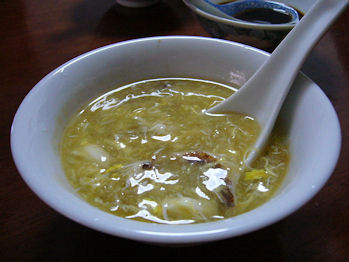
homemade shark fin soup China, Hong Kong and Taiwan consume 95 percent of the world's dried shark's fins, which are most commonly prepared as a gelatinous tangle in a chicken stock-based soup. Because fins are dried, skinned, bleached and treated with ammonia before they hit the market, it is nearly impossible to determine which fins come from which species. [Source: Jonathan Kaiman, Los Angeles Times, January 31, 2012]
Demand for shark fin soup has skyrocketed in the last several decades as more people can afford to serve it at business banquets and wedding feasts, thanks to the growth of China's middle class. L.A. food critic Jonathan Gold wrote in the Los Angeles Times, “There is no double happiness in the future of sharks. As China's middle class continues to grow, the number of aficionados who can afford the delicacy is expanding. To meet accelerating demand, efficient new fishing boats have found ways to catch more sharks — way more sharks, many millions each year. [Source: Jonathan Gold, Los Angeles Times, August 7, 2011.
As important as shark's fin is to traditional Cantonese banquet cuisine, we have reached the point where some shark populations have been reduced to 10 percent of historical levels, and nearly a third of shark species are approaching the point of extinction. We need sharks: As top-dog predators, they keep the ocean's ecosystems in balance. And we need to stop eating shark's fin, at least until shark populations have had a chance to recuperate.”
Critics of Shark Fin Soup
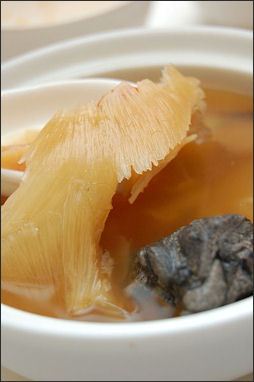
restaurant shark fin soup The San Francisco-based WildAid, which began campaigning against the shark fin trade in 2000, estimates that up to 79 million sharks are killed each year, many of them for their fins. This has led some shark populations to drop by as much as 90 percent within the last few decades, the group says, bringing some species to the brink of extinction and wreaking havoc on aquatic ecosystems. [Source: Jonathan Kaiman, Los Angeles Times, January 31, 2012]
L.A. food critic Jonathan Gold wrote in the Los Angeles Times, ‘since there is a larger market for shark fins than for shark meat, some fisherman resort to "finning," a barbaric and wasteful practice in which the fins are hacked off live sharks, after which the bleeding, crippled animals are tossed back into the sea to drown. There is no sustainable source of shark's fin. [Source: Jonathan Gold, Los Angeles Times, August 7, 2011]
By the time a fin is dried, cleaned and sold at market, it is impossible, short of DNA testing, to determine whether it is from an endangered hammerhead or a merely threatened blue shark; from the U.S. coast, where finning is illegal, or from unregulated international waters. It is impossible, even with DNA testing, to tell whether a particular fin is a byproduct of fishing for shark meat, which is legal (although perhaps it shouldn't be), or from a pirate finning operation.
Alex Ong, chef at the Pan-Asian restaurant Betelnut in San Francisco's Marina district, told AP the broth in shark fin soup is what provides most of the flavor, and the fins themselves can be easily substituted by other seafood or even creatively disguised starch. Ong said when he saw video footage of fisherman slicing off sharks' fins and tossing the animals back into the ocean to die, the images hit him "right in the gut" and he vowed to work to stop the practice. [Source: Robin Hindery, Associated Press, May 6, 2011]
Jonathan Kaiman wrote in the Los Angeles Times, "Recently a strong push by international groups, with the help of a little star power, has made refusing to eat the dish a popular environmental statement akin to shunning furs or driving a Prius. Celebrity chef Gordon Ramsay has pressured restaurants in London to stop serving the dish, and Richard Branson, chief executive of Virgin Air, has stopped his airline from transporting fins. WildAid's "celebrity ambassadors" include actors Harrison Ford, Kate Hudson and Ralph Fiennes. Branson and and Yao Ming have leant support to Shanghai WildAid, a charity, launched a campaign to persuade Chinese people to give up eating the delicacy. [Source: Jonathan Kaiman, Los Angeles Times, January 31, 2012]
Most Westerners, unschooled in its pleasures, consider it a pointless delicacy. Juliet Eilperin, an American author, sums up the general Western viewpoint in “Demon Fish”, a book about sharks. A frond of fin, she says, is “a translucent, tasteless bit of noodle” and shark’s fin soup “one of the greatest scams of all time”. Eating it, Ms Eilperin suggests, is even more reprehensible than eating other morally objectionable foods such as delicious foie gras, because there is “no gastronomic pay-off”. [Source: The Economist, October 1, 2011]
Shark Finning and the Cruel, Lucrative Shark Fin Trade

shark finning More than 70 million sharks were killed in 2012, largely to satisfy demand for their fins, which are used to make shark fin soup. Most of these sharks are “finned” — their fins are sliced off while the sharks are still alive — then dumped back into the ocean to drown or bleed to death. The number of sharks taken solely for their fins increased 2,000 percent between 1990 and 2000 and has continued soaring since then. In addition catching sharks for shark fin soup is often very cruel. Finning continues being banned in roughly one-third of countries where it is practiced, according to the Pew Environment Group.
Because the fins are so valuable and the meat isn't, the fins of captured sharks are often lopped off and still-alive sharks are thrown back in the water where they die a slow agonizing death. The practice is prohibited, but loopholes in the regulation have allowed the ban to be widely ignored.
The trade in shark fins is extremely profitable. Shark fins are easy for fishermen to transport and preserve by sun drying. In 2007, Mexican fishermen were pad $100 per kilogram for dried fins they delivered. In contrast they were paid less than $1.50 a kilogram for the shark meat. Middle men are able to sell quality shark fins to restaurants for up to $2,350 a kilogram. Soups made with these fins sell for a much as $250 a bowl.
With water off of Asia deleted of sharks, fishermen are focusing on places where sharks are still plentiful such the Pacific off the coast of Ecuador, Peru and Central America. Describing the first rung of shark fin trade in Manta Ecuador, Juan Forero wrote in the New York Times, “Early every morning, the cold water lapping up on the beach here is stained red with blood as surly, determined men in ragged T-shirts, drag hundreds of shark carcasses off wooden skiffs and into the white sand...using eight-inch, or 20-centimeter, boning knives with quick precision, they dismember the once-mighty predators, cutting off heads, carving up big slabs of meat, slashing off the tails, Most important they cut off the fins — dorsals and pectorals — a “set” that can fetch $100 or more.” From Ecuador the fins are shipped by a quasi-legal network to Hong Kong, Beijing, Taiwan and Singapore.
A shortage of shark fins has led suppliers to look for other sources to meet demand. Among the sources they are turning to are the wings of manta rays. They are targeted because the swim near the surface and are easy to catch and their wings are big. Most the fins end up in a poor man’s shark fin soup made ray cartilage and low grade shark fins.
Shark Fin Trade in Hong Kong and the U.S.
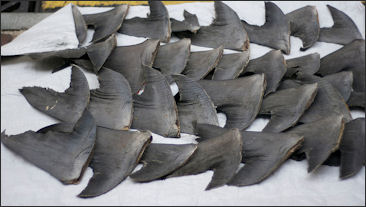
Shark fins in Hong Kong In Hong Kong, many restaurants offer a plethora of shark’s fin dishes. Among them: Lung King Heen, which has three Michelin stars, and Man Wah in the Mandarin Oriental hotel, though both have also recently introduced shark-free options for banquets.[Source: Bettina Wassener, New York Times, June 20 2010]
Retailers in Hong Kong charge more than 2,000 Hong Kong dollars, or $260, per catty, a traditional weight measure commonly used in markets in Hong Kong and equal to a bit more than 600 grams, or 21 ounces. One catty makes about 10 portions of shark’s fin soup.
Sharks are fished in oceans around the world, but Hong Kong is the hub for the trade in their fins, handling between 50 percent and 80 percent of the global market. The fins go on to mainland China or to Malaysia, Indonesia, Thailand and Taiwan. Hong Kong itself is also a major consumer.
The international environmental group Wild Aid reported that shark fins mainly exported from Hong Kong and sold at restaurants throughout Asia contained levels of mercury that were 42 times higher than levels deemed safe for human consumption. The mercury comes from pollution passed up through the food chain.
The problem is not only in East Asia. Out of 32 samples taken from shark fin soup sold at restaurants in the U.S. identifiable shark DNA was found in 26 bowls (81 percent) from sharks listed as endangered, vulnerable or near threatened, according to a report released by the Pew Environment Group. The study was based on tests of the soup in 14 U.S. cities [Source: Barbara Liston, Reuters, August 10, 2012]
Efforts to Reduce Shark Fin Soup Consumption
Bettina Wassener wrote in the New York Times, “A proliferation of videos on YouTube — like one of a whale shark that washed up in the Philippines this year, still alive but with its fins cut off — has really pushed the issue mainstream. And it hammered home how the precious fins are harvested.”
In 2011, Hawaii became the first state in the U.S. to ban shark fin soup. Many members sf the Chinese community there were upset about the ban. But, Michael Skoletsky, executive director at Shark Savers in New York, told the New York Times, with all the other issues legislators have to deal with — from unemployment to oil spills — it will be very hard to get it on the agenda of other states. [Source: Bettina Wassener, New York Times, June 20 2010]
There is some irony though that such a big deal is being made about consuming shark fin soup and no one seems to make a big deal about Australians eating shark (which they call flake) and Britons using shark in fish and chips now that cod stocks have been depleted. Many feel that the shark fin issue is detracting from the bigger issue of overfishing of many species.
Bans on Shark Fin Soup in the United States
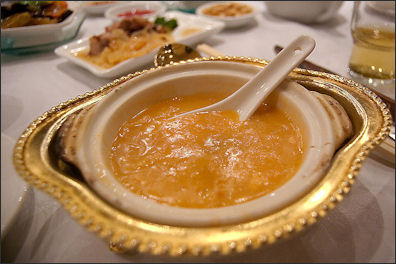
Shark fin soup
In the United States several states have moved to ban shark's fin imports to help cut the demand for shark fishing worldwide. Hawaii was the first to do so, Washington, Guam and Oregon have enacted similar laws. The Florida Fish and Wildlife Conservation Commission is considering banning the catch of tiger sharks and three species of hammerhead sharks. Shark finning is restricted in U.S. waters.
In October 2011, California's governor Jerry Brown signed a bill banning the sale, trade and possession of shark fins. "The practice of cutting the fins off of living sharks and dumping them back in the ocean is not only cruel, but it harms the health of our oceans," Brown wrote in a statement. The ban was supported by celebrities, including actress Bo Derek and retired NBA center Yao Ming of China. It also was backed by the Humane Society of the United States and Humane Society International, and other environmental advocates. [Source: Judy Lin, Huffington Post, October 7, 2011]
Images of Chinese basketball star Yao Ming appeared on San Francisco city buses and billboards urging residents in Chinese and English to "Join me, say no to shark fin soup." he also filmed a public service announcement for the international conservation group WildAid. Hong Kong actress Sharon Kwok also expressed her support the ban of shark fin soup.
The bill had split the Asian delegation in the California Legislature. Assemblyman Paul Fong, D-Cupertino, who authored the bill, said it was needed to protect endangered shark species, but others called the measure racist because the fins are used in a soup. The fins can sell for $600 a pound, and the soup can cost $80 a bowl. The California market for shark-fin soup is the largest outside Asia. California controls an estimated 85 percent of the U.S. trade in the fins. During a legislative debate, Sen. Ted Lieu, D-Torrance, noted the bill would ban only part of the shark while permitting the continued consumption of shark skin or steaks.
Neil Hammerschlag, who directs the marine conservation program at the University of Miami's Rosenstiel School of Marine and Atmospheric Research, noted these restrictions can make a difference a significant difference. He said that recent studies show that when it comes to recreational shark fishing, killing just a few large sharks in a local area can drastically reduce population levels.
John Breall, a San Francisco lawyer who represents Asian-American restaurateurs, importers and civic leaders, is fighting a new California ban on the possession or sale of fins, which he calls “anti-Chinese.” [Source: Reuters, 2012]
Does a Ban on Shark Fin Soup Discriminate Against Asians

Shark fins confiscated from King Diamond Many Chinese accuse the anti-shark-fin soup campaigners of double standards. Why should shark’s fin, an important part of certain Chinese feasts, be banned, they ask? Why not ban bluefin tuna, which is also critically endangered, but more widely eaten by Westerners? [Source: the Economist]
Critics of the shark fin ban say the consumption of shark fins is a cherished cultural tradition. "This is traditional for us. When you say no to shark fin, that's profiling," said Henry Cheung, president of Charlie Seafood Inc., a San Francisco-based wholesaler and importer. "The law doesn't ban shark meat or a handbag made with shark skin - just fins. I myself believe it's unfair." Cheung also questioned the need for a ban on a product he says is already losing popularity, particularly among young people. He said his business stopped importing shark fins years ago, due to declining demand. [Source: Robin Hindery, Associated Press, May 6, 2011]
In a statement issued February 2011, when shark fin banning legislation was introduced in California, state Sen. Leland Yee (D-San Francisco) called the measure "an unfair attack on Asian culture and cuisine." Yee, who was a candidate for mayor of San Francisco, said efforts should be focused on strengthening conservation efforts and increasing penalties for illegally killing sharks.
L.A. food critic Jonathan Gold wrote in the Los Angeles Times that it is true the ban on shark fin soup “would affect mostly Chinese Americans, who make up almost all of the market for fins. It could be argued that there should also be bans on bluefin tuna and caviar from Caspian sturgeon, which are even closer to extinction than are most species of sharks, and I'd agree. Chinese Americans are being asked to give up something real, with many years of tradition.
But Chinese culinary culture has proved resilient over the centuries, as able to absorb such foreign ingredients as chiles and squashes as it has been to withstand the absence of sea turtle skirt and bear paw, whose preparation obsessed the earliest Chinese gourmets. There is no third way with shark's fin — we either stop eating it because we choose to preserve the species, or we stop eating it because soon there will be none left to eat.
Efforts to Reduce the Consumption of Shark Fin Soup in Hong Kong
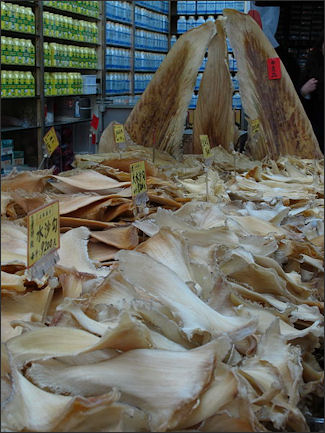
Shark fins in Taiwan “The question of whether to eat shark’s fin soup has finally begun to gain traction with the Hong Kong public,” Bettina Wassener, New York Times, ‘spawning Internet discussion and campaign groups. The debate here could well influence the survival of numerous shark species.” [Source: Bettina Wassener, New York Times, June 20 2010]
A woman who said she decided not serve shark’s fin soup at their wedding reception in Hong Kong told the New York Times, “The waiter who took our banquet order gave us a pretty strange look, and my father-in-law had to explain in his welcoming speech that we felt strongly about being environmental, and that we were not just being cheap.” But only about 5 percent of couples choose shark-free menus at their weddings, according to a survey by a wedding industry group in 2009.
“Sales are starting to fall off slowly,” Wassener wrote. “Several vendors of dried seafood in the bustling Hong Kong neighborhood of Sheung Wan said last week that they now sold significantly less than they had a few years ago. People are a lot more aware about protecting the environment, said an employee at one of the dozens of stores in the area...There is less demand now, he said... Hong Kong now has several groups that are opposed to shark finning. In May 2010, restaurants and hotels pledged to offer shark-free options for banquets. Alibaba, the Chinese answer to eBay, has banned the sale of the fins on its site.
Hong Kong Disneyland has dropped shark fin soup from it wedding banquet menu. Environmental groups had put pressure on Hong Kong Disneyland to take shark fin soup off its banquet menu. Hong Kong Disneyland initially refused to do so but did agree to provide a brochure that explained the harm caused by the shark fin industry to all that requested the soup. Representatives from Disneyland said that shark fins were taken from “reliable and responsible suppliers” who kill sharks and use the entire fish and their policy on the soup to strike a balance between “environmental concerns and respect of local culture.”
Fergus Fung, founder of WOM, a Hong Kong restaurant guide, told the New York Times, “Ultimately, we’ll see shark’s fin consumption phasing off here. But we’re still a long way away from sharks disappearing completely from menus. It’s still a very, very big dish.” [Wassener, Op. Cit]
Efforts to Reduce the Consumption of Shark Fin Soup in China
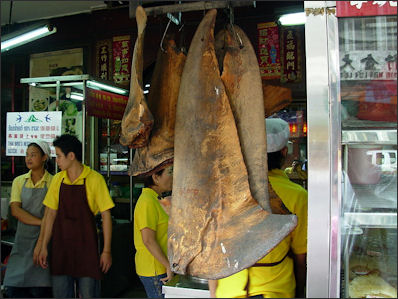
Shark fins in Thailand China is the largest consumer of shark fin soup. Efforts are being made there to get Chinese to stop consuming it. The actor Jackie Chan, film director Ang Lee and basketball player Yao Ming have all spoken out against consuming it. In a move that is common in the West but rarely seen in the China Yao spoke out for the shark fin cause in public. At a press conference in Beijing held by the conservation group Wild Aid the former player for the Shanghai Sharks vowed he never would eat shark fin soup again. He encouraged his fellow Chinese to do the same and said “endangered species are our friends.”
A campaign by WildAid featuring Yao Ming has appeared on CCTV, the main state television broadcaster, and on billboards and public screens in major cities. In one 30-second spot that first aired on Chinese television in 2009, diners in an upscale restaurant are served bowls of shark fin soup while next to them a de-finned shark lies writhing in a tank. Yao, wearing a disapproving scowl, pushes his bowl away. "Remember: When the buying stops, the killing can too," he says. [Source: Jonathan Kaiman, Los Angeles Times, January 31, 2012]
Shark fin soup has been taken off the menu at state banquets in China. In March 2011, Ding Liguo, a wealthy industrialist and deputy in the National People's Congress, proposed a ban to China's highest legislature, but the government has not yet taken steps toward implementation. In November 2011, the Peninsula Hotel Group, one of the most prestigious hotel chains in Asia, decided to stop serving shark fin, a move that took effect Jan. 1. In an emailed message, a hotel spokesman said that the ban had been met with understanding and praise in Hong Kong, Beijing and especially Shanghai, Yao's hometown.
Some restaurants in Beijing are beginning to notice the effects of the campaign. Zhu Yingxi, the manager of Jingde Xiaoguan, said the dish has not been selling well in recent months because of the economic slowdown as well as the pressure. Tucked away on a glossy menu in the Herbal Cafe, a Beijing restaurant known for its herbal teas and low-fat Cantonese dishes, is a little nod to environmental advocacy. For about $2.50, customers can buy a bowl of imitation shark fin soup made of vegetable stock and potato noodles. "If it was real, then you'd have to kill sharks," said Zhang Gui, the manager. "Sharks are very precious animals." But his efforts thus far seem to have been largely ignored in China. Many people in China are simply not aware that shark finning is wasteful, cruel and unsustainable, Skoletsky told the New York Times. which also supports the campaign.” [Source: Bettina Wassener, New York Times, June 20 2010]
Banning Shark Fin in China an Uphill Battle
But changing attitudes is an uphill struggle. A survey by McKinsey, for example, showed last year that even though half of Chinese consumers said they wanted to understand the environmental impact of products they purchased, few actually walk the talk: Fewer than 3 percent ever purchased green products.” [New York Times]

shark fins for sale Jonathan Kaiman wrote in the Los Angeles Times, “However, shark fin remains a fixture in many high-end dining establishments throughout Beijing. At one plush-carpeted restaurant, A-Sen Abalone, diners can order a variety of innovative shark fin dishes, including stir-fried shark fin ($126) and shark fin served in a papaya. [Source: Jonathan Kaiman, Los Angeles Times, January 31, 2012]
When the environmental organization Green Beagle surveyed four- and five-star Beijing hotels in December, almost half of them said they had stopped serving shark fin, mainly for environmental reasons. But when the organization's representatives visited the hotels in the guise of customers, all but one establishment said shark fin was available.
Some shark fin connoisseurs are holding on to what they perceive as a bastion of traditional Chinese cooking and a boon to fisheries in poor coastal towns. Li Dinggui, the general secretary of the Marine Products Assn. in Hong Kong, said the delicacy has been unfairly demonized. He argued that the oft-denounced practice of "finning," in which fishermen cut off the fin and roll the rest of the shark back into the water to die slowly, is not as common as environmentalists make it seem. "To ban the shark fin, which is about 30 percent of the value of the shark, would be like banning fisheries in general," he said. "We should not ban what should not be banned."
Zhu Yingxi, the manager of Jingde Xiaoguan, rejected the notion that shark fin soup is an important part of Chinese culture. "It's a token of generosity in government and business," she said. "Culture is something that everybody has exposure to. Shark fin just isn't that type of thing."
Will Anti-Shark-Fin Campaigns Persuade Chinese to Give up Shark's Fin Soup?
The Economist reported: “Celebrity endorsements and well-meaning Californians aside, the question now is whether wealthy Chinese in Asia can be persuaded to stop eating shark’s fin. Sceptics abound. Being lectured by Westerners on cultural or moral issues gets right up the noses of most Chinese. But if disapproval of the consumption of shark’s fin encourages the Chinese to see it as luo hou (backward), one of the most dreaded of all Chinese epithets, they might want to renounce the stuff anyway.” [Source: The Economist, October 1, 2011]
This has already happened with spitting in the streets, which many Chinese now regard as a backward habit. Eating dogs, too, is increasingly viewed as barbaric (a 600-year old dog-eating festival in eastern China was cancelled in September after public uproar). If the new Chinese elite can be persuaded that deliberately eating endangered species ill befits their aspirations to cosmopolitanism, there might be some hope for the sharks. Other threatened creatures that find their way, legally and illegally, into Chinese cooking pots could also be spared.
Already, farms are springing up outside Chinese cities to cater to more sophisticated Chinese consumers seeking out “green foods” such as free-range meat and poultry, or organically grown vegetables. Ethical and environmental concerns will surely follow. There are precedents for the disappearance of classic Chinese dishes on conservation grounds. Bear’s paw, for example, is no longer eaten openly. Instead, you may be offered imitation bear’s paw made from mutton pushed into a paw-shaped mould. Imitation shark’s fin is already available should anybody want it. And when the social cachet of a fabulously expensive delicacy is required, these days a bottle of Château Lafite might do.
Campaign Against Shark Fin Soup in China
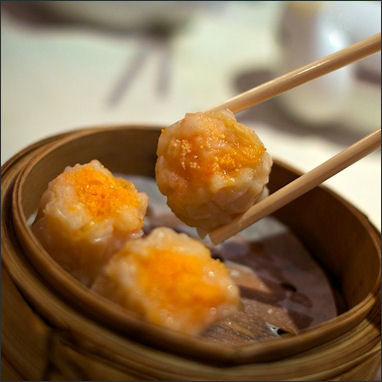
Shark fin dumpling Simon Denyer wrote in the Washington Post, “Just a few years ago, most Chinese people were oblivious to what was happening. One survey carried out in 2005-2006 showed 80 percent of respondents did not even know the soup – known in Chinese as “fish wing” soup — was made with shark fins. But in 2006, WildAid enlisted Chinese professional basketball player Yao Ming, who played for the Houston Rockets, to front a public awareness campaign. One ad showed diners refusing the soup when confronted with the gory reality of sharks whose fins have been sliced off. The finless fish are often tossed back into the sea to die. [Source: Simon Denyer, Washington Post, October 19, 2013 ^^]
“A successful businessman, Jim Zhang, was so moved that he began working to change attitudes about sharks, eventually becoming a full-time environmentalist. In 2010, he conducted a poll on the popular microblogging service weibo that drew 30,000 participants, 99 percent of whom supported a ban on shark imports. “That really encouraged me,” he said. “I realized that we have a voice here, and we have to take action.” Zhang convinced about 30 members of China’s 2,987-delegate parliament, the National People’s Congress, to sign a proposal in 2011 calling for a ban on shark fin imports. The initial proposal was rejected by the government, but a second one had more success. It came amid a growing effort by many countries to limit the trade in endangered shark species and their fins. ^^
“In July 2012, the Chinese government pledged to ban shark fin soup from official banquets within three years. Then, as part of its new campaign against extravagance, instructions went out to officials all around the country in February and March to ban lavish banquets. Instead, they were told to serve “ordinary food” and not to offer shark fin soup or dishes made with protected wildlife. In September 2013, similar instructions were sent out by the government in Hong Kong — a major center for the shark fin industry – “to demonstrate its commitment to green living and sustainability.” There was also help from state-run media: China Central Television ran a series of reports this year that found that restaurants were serving up fake shark fin soup — using starch, gelatine and seaweed gum. Even more damaging was the finding that many soup samples contained dangerous levels of cadmium and methyl mercury. ^^
“Conservationists said the campaign had been so successful partly because it had mobilized young people. With social media allowing them to express themselves more freely, the shark fin campaign almost became part of pop culture. A 12-year-old student, Huang Weilan, said in an interview that she had collected nearly 200 signatures on an anti-shark-fin petition from friends of her parents. “It’s quite easy to convince people because I am a kid, “ she said. “Generally adults don’t like to say no to children.” ^^
“On a recent sunny Saturday morning in Beijing, students from the China University of Mining and Technology gathered in a park collecting pledges from young and old not to consume the soup. Sixty-eight-year-old Zhang Xianying, walking his grandson in a stroller, said he had barely had enough food to survive when he was young, and he had tasted shark fin soup more recently “just so I could tell people I had eaten it.” But he said he was happy to sign the pledge after learning how cruel the trade was, and how important sharks were to the marine food chain.” ^^
Shark Fin Soup Banned at State Banquets in China

confiscated shark fins In July 2012, Bettina Wassener wrote in the New York Times, “China said that it would prohibit official banquets from serving shark fin soup. The ban, reported by Xinhua, could take as many as three years to take effect, and it remains unclear how widely it will be adhered to across a sprawling nation where orders issued by Beijing are often shrugged off by officials in faraway regions and provinces. Still, the decision to stop serving shark fin soup at official functions was welcomed by environmental campaigners. Experts have long cautioned that soaring demand for the soup over the past two decades has imperiled shark populations around the globe. [Source: Bettina Wassener, New York Times, July 3, 2012]
“This is a very positive step forward,” said Andy Cornish, director of conservation at W.W.F. in Hong Kong. “It is the first time that the Chinese central government has expressed a decision to phase out shark fin from banquets funded by taxpayers — money.” He said the move would send an important signal to consumers in China, the largest market for the fins. Stan Shea, a project coordinator in Hong Kong at Bloom Association, a marine conservation organization, likewise welcomed the policy change, saying it represented a “big step” to help shark populations.
“The Hong Kong government has repeatedly dodged the question of implementing a banqueting ban on shark fin soup, saying that it sees no need for such guidelines,” said Mr. Cornish of W.W.F. “We strongly hope that the new administration in Hong Kong government will shortly follow suit.” The Hong Kong Environmental Protection Department’ss media office, in an e-mail, reiterated its long-held stance that the government carries out the Convention on International Trade in Endangered Species of Wild Fauna and Flora, known by its acronym, Cites. Environmentalists, however, argue that Cites should list as threatened a far larger number of shark species than it does. Hong Kong government guidelines stipulate that official banquets not be “extravagant,” and this means menus do not “generally include shark fin,” the media department added. It did not say whether Hong Kong would echo Beijing’s decision to ban the dish from official banquets.
Demand for Shark Fin Soup Plummets
Simon Denyer wrote in the Washington Post, “The demand for shark fins has plunged, providing a rare victory for conservationists that could have wider implications for other endangered wildlife. Thanks to a former NBA star, a coalition of Chinese business leaders, celebrities and students, and some unlikely investigative journalism, eating shark fin soup is no longer fashionable here. But what really tipped the balance was a government campaign against extravagance that has seen the soup banned from official banquets. [Source: Simon Denyer, Washington Post, October 19, 2013 ^^]
“People said it was impossible to change China, but the evidence we are now getting says consumption of shark fin soup in China is down by 50 to 70 percent in the last two years,” said Peter Knights, executive director of WildAid, a San Francisco-based group that has promoted awareness about the shark trade. The drop is also reflected in government and industry statistics. “It is a myth that people in Asia don’t care about wildlife,” Knights said. “Consumption is based on ignorance rather than malice. ” ^^
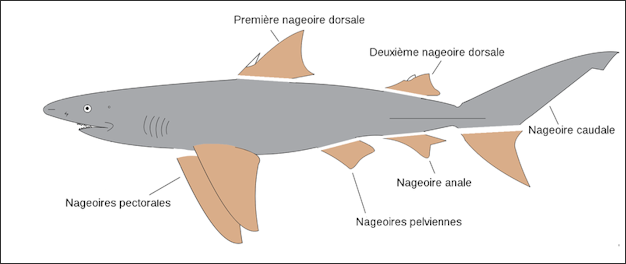
Shark finning schema
Felicia Sonmez of AFP wrote: The tide began to turn in 2012, when the ruling Communist Party announced a government ban on serving shark fin, bird's nest soup and other wild animal products at official functions, saying that it would set a precedent that would help protect endangered species. Around the same time new leader Xi Jinping launched a much-publicised austerity drive for the ruling classes, in tandem with an anti-corruption push that has claimed notable scalps despite a lack of systemic reforms. WildAid also began its high-profile, celebrity-backed ad campaign on the issue, targeting consumers with the tagline: "When the buying stops, the killing can too." [Source: Felicia Sonmez, AFP, August 20, 2014]
Denyer wrote: In February 2013, China’s Commerce Ministry said the consumption of shark fin soup during the Spring Break holiday had declined by 70 percent from a year earlier. In Hong Kong, industry groups say imports of shark fin have declined by between 20 and 30 percent this year. Anecdotal evidence also suggests prices of shark fin are falling globally and fishermen in parts of Africa are turning away from the trade. In interviews this month at Beijing’s Lianhong Marine Dry Products Market, traders said business was down by about 70 percent. A half-kilo (1.1 pounds) of dried shark fin that once might have sold for $165 had been reduced to $110 in one shop to clear stocks. “Since the rule came out, who dares to eat shark fin?” said one shop owner. Buoyed by the results of the shark fin campaign, conservationists are now turning their attention to the trade in ivory and rhino horn. ^^
Hard Times for the Chinese Shark Fin Business
Simon Denyer wrote in the Washington Post, ““In high-end seafood restaurants in Beijing, shark fin soup is still on the menu — for between $60 and $325 a bowl — but some hotels and restaurants no longer offer it. Chen Jun, a chef in the western city of Lanzhou, said business was down by more than half, some restaurants had closed and some chefs had been laid off. “Of course I know shark fin is controversial — I learnt it from Yao Ming’s advertisements,” he said by telephone. “I feel guilty in my heart, but what else can I do?” [Source: Simon Denyer, Washington Post, October 19, 2013 ^^]
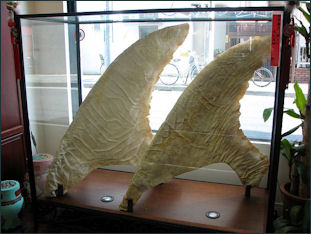
shark fins in Chinese
medicine shop According to WildAid, the biggest impact has been in Guangzhou, the heart of China's shark fin industry. Felicia Sonmez of AFP wrote: A sprawling market floor in Guangzhou was once a prime location for shark fin, one of China's most expensive delicacies. But now it lies deserted, thanks to a ban from official banquet tables and a celebrity-driven ad campaign. One shopkeeper at the Shanhaicheng centre quietly ate his lunch at a desk, flanked by four glum-looking colleagues and giant white sacks overflowing with thousands of dollars' worth of unsold grey stock. A woman at the next stall over fiddled with her mobile phone, plastic bags of dried yellow fins untouched on the shelves behind her. Outside, the bustling, narrow streets in the southern Chinese city were packed. "I don't eat shark fin," said a 23-year-old shopper surnamed Ling, pausing between a stash of multicoloured dried starfish and an assortment of wood ear mushrooms. "It's dirty. It's cruel. And I think it's quite expensive.”“ [Source: Felicia Sonmez, AFP, August 20, 2014 -]
A WildAid survey released in August 2014 “said shark fin sales had slumped in the city, with retail prices slumping an average 57 percent and wholesale costs dropping by 47 percent. In neighbouring Hong Kong, a major transit point for the trade, import-export volumes have plunged. The largest category, undried fins with cartilage, went from almost 6,800 tonnes in 2011 to less than two tonnes in 2013, government statistics showed — although dried fins with cartilage still stood at around 3,800 tonnes. Several major hotel chains and airlines in the region have banned it and WildAid's executive director Peter Knight said: "Demand reduction can be very effective. The more people learn about the consequences of eating shark fin soup, the less they want to participate in the trade." Government bans on the dish, he added, "helped send the right message and this could be a model to address issues such as ivory". -
“At Guangzhou's upscale Taikoo Hui shopping mall, a 36-year-old businesswoman surnamed Liu said she stopped eating shark fin "two or three years ago". "It doesn't taste all that different from eating a vegetable," she said. "So it's not necessary to kill an animal in order to eat it." The elegant dining room of the city's Ah Yat Abalone Restaurant was full of customers, but manager Ye Chaoping said most were there for the abalone — a slow-growing shellfish that is itself the object of concerns about overfishing — rather than the wide assortment of shark fin dishes. "There's been a lot of TV ads about it, so more and more people are refusing to eat it," she said. "These days, a lot of government officials are afraid to eat it, too." -
Seizure of 38,500 Shark Fins in Hong Kong in 2020 Shows the Trade Is Still Very Much Alive
In May 2020, it was announced a record 26 tons of shark fin — from 38,500 sharks — were seized by customs officers in Hong Kong. It was the largest bust of its kind ever in Hong Kong. AFP reported: “The record haul was discovered in two containers from Ecuador, and highlights the continued demand for shark fin, which is served at wedding banquets in many Chinese communities. The city's customs department unveiled the haul on Wednesday and said it smashed previous records. "Each consignment consisting of 13 tonnes broke the previous record seizure of 3.8 tonnes of [Source: AFP, May 7, 2020] controlled shark fins made in 2019, " customs official Danny Cheung told reporters.
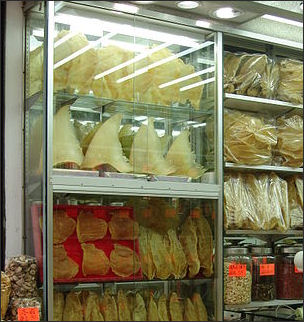 “Most of the fins came from thresher and silky sharks, both endangered species. A 57-year-old man was arrested but has been released on bail pending further enquiries. The sale and consumption of shark fin is not illegal in Hong Kong, but must be licensed. Years of campaigning by environmentalists and celebrities like Chinese basketball star Yao Ming have led to the dish becoming less fashionable among younger consumers in China, Macau, Hong Kong and Taiwan.
“Most of the fins came from thresher and silky sharks, both endangered species. A 57-year-old man was arrested but has been released on bail pending further enquiries. The sale and consumption of shark fin is not illegal in Hong Kong, but must be licensed. Years of campaigning by environmentalists and celebrities like Chinese basketball star Yao Ming have led to the dish becoming less fashionable among younger consumers in China, Macau, Hong Kong and Taiwan.
“But it remains stubbornly popular among older generations and many prominent hotels and restaurants still offer it. A 2018 survey by the World Wildlife Fund (WWF) found seven out of 10 Hong Kongers had eaten shark fin that year. "There is still strong cultural value placed on consuming shark fin, particularly at weddings, business events and family gatherings like the upcoming Mother's Day, " senior conservation officer Gloria Lai Pui-yin told AFP, . “Some restaurants and hotels had signed WWF's "no shark fin" pledge but many continued to offer the dish, she added.
“Wild Aid estimates some 73 million sharks are killed every year for the trade. Their research says consumption has dropped significantly on the Chinese mainland but there is growing appetite for the dish in Thailand, Vietnam and Indonesia. With its busy port and international connections, Hong Kong has long been a major trafficking route for wildlife and drug smugglers. Importing endangered species without a licence is illegal and carries a maximum penalty of 10 years in jail and a HK$10 million ($1.3 million) fine.
In September 2021, Colombian authorities confiscated an illegal shipment of 3,493 shark fins at Bogota's airport bound for Hong Kong, further evidence that shark fin trade was thriving. [Source: Reuters, September 25, 2021]
Image Source: Wikimedia Commons
Text Sources: Mostly National Geographic articles. Also the New York Times, Washington Post, Los Angeles Times, Smithsonian magazine, Natural History magazine, Discover magazine, Times of London, The New Yorker, Time, Newsweek, Reuters, AP, AFP, Lonely Planet Guides, Compton s Encyclopedia and various books and other publications.
Last updated March 2023
